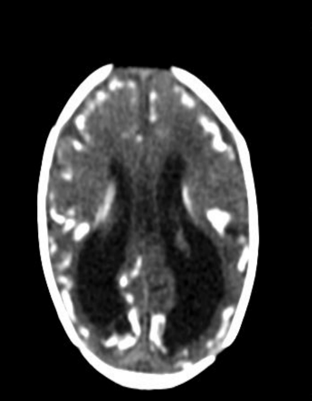Neonatal toxoplasmosis, a preventable infection. Case report
Main Article Content
Abstract
Background: Congenital toxoplasmosis is a parasitic infection caused by Toxoplasma gondii, acquired by pregnant women mainly through the ingestion of contaminated food. Depending on the pregnancy trimester in which the infection is acquired, it may present mild clinical manifestations or have irreversible sequelae that affect the newborn's health and quality of life. Case report: 35-week-old newborn with neonatal toxoplasmosis. Birth weight of 2 125 grams, hepatosplenomegaly, generalized ecchymotic and erythematous lesions on the skin, ophthalmological changes, mixed hyperbilirubinemia, positive toxoplasma serology, and imaging studies compatible with toxoplasmosis. The indicated treatment was pyrimethamine, sulfadiazine, folinic acid, and systemic corticosteroids. Conclusions: The case emphasizes the importance of education for pregnant women to prevent infection, make a diagnosis, and begin timely treatment to reduce complications and sequelae of the disease. Prevention can be achieved through the prenatal following.
Downloads
Article Details

This work is licensed under a Creative Commons Attribution-NonCommercial-NoDerivatives 4.0 International License.
Creative Commons
License Attribution-NonCommercial-ShareAlike 4.0 International (CC BY-NC-SA 4.0)
You are free to:
Share - copy and redistribute the material in any medium or format.
Adapt - remix, transform, and build upon the material The licensor cannot revoke these freedoms as long as you follow the license terms.
• Attribution — You must give appropriate credit, provide a link to the license, and indicate if changes were made. You may do so in any reasonable manner, but not in any way that suggests the licensor endorses you or your use.
• NonCommercial — You may not use the material for commercial purposes.
• ShareAlike — If you remix, transform, or build upon the material, you must distribute your contributions under the same license as the original.
• No additional restrictions — You may not apply legal terms or technological measures that legally restrict others from doing anything the license permits.
References
Alvarado JL, Zárate A, Rodríguez AJ, Guerrero C y Giraldo M. Toxoplasmosis congénita: la importancia de la adherencia a las guías y las implicaciones clínicas en Colombia. Bol Med Hosp Infant Mex. 2021;78(4):370-375. DOI: https://doi.org/10.24875/BMHIM.20000238
El Bissati K, Levigne P, Lykins J, Adlaoui EB, Barkat A, Berraho A, et al. Global initiative for congenital toxoplasmosis:an observational and international comparative clinical analysis. Emerg Microbes Infect. 2018; 7:165. DOI: https://doi.org/10.1038/s41426-018-0164-4
Torgerson PR, Mastroiacovo P. The global burden of congenital toxoplasmosis: a systematic review. Bull World Health Organ. 2013;91(7):501-508. DOI: https://doi.org/10.2471/BLT.12.111732
Oz HS. Fetomaternal and Pediatric Toxoplasmosis. J Pediatr Infect Dis. 2017;12(4): 202–208. DOI: https://doi.org/10.1055/s-0037-1603942
Amador R, Couto MJ, Peña A, Alonso RM, Pupo L. Presentación de un caso con toxoplasmosis congénita. Rev Cubana Obstet Ginecol. 2016;42(1).
Naranjo BT, León MA, Iglesias MB, Sainz L. Toxoplasmosis ocular: aspectos clínico-epidemiológicos en edad pediátrica. Rev Ciencias Médicas. 2020;24(4):1-11.
Sánchez A, Cobos D, Sánchez L, Miranda A, Camejo L, Araujo L. La Toxoplasmosis observada como un problema no resuelto. Rev Cubana Invest Bioméd. 2016;35(3):272-283.
Rueda YS, Valbuena L, Quintero N, Pinilla A, Sayago J. Toxoplasmosis congénita, una mirada en la actualidad del tratamiento; revisión de la literatura. MedUNAB. 2019;22(1):51-63. DOI: https://doi.org/10.29375/01237047.2612
Maldonado YA, Leer JS, Byington CL, Barnett ED, Davies HD, Edwards KM, et al. Diagnóstico, tratamiento y prevención de la toxoplasmosis congénita en los Estados Unidos. Pediatrics. 2017; 139 (2):e20163860.
Durlach R, Freuler C, Messina M, Freilij H, González S, Venturini MC, et al. Consenso argentino de toxoplasmosis congénita 2020. Medicina. 2021; 81: 257-268.
Thellaeche C, Cervantes M, Miahuchi D. Toxoplasmosis congénita, reporte de casos. Rev. bol. ped. 2014; 53(1 ): 12-16.
Ocaña ND, Paredes AP, Raysa FA, Pazmiño EK. Toxoplasmosis congénita diagnóstico y tratamiento. Recimundo. 2020;4(3), 118-127.





